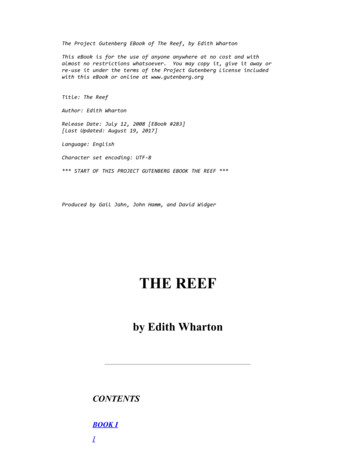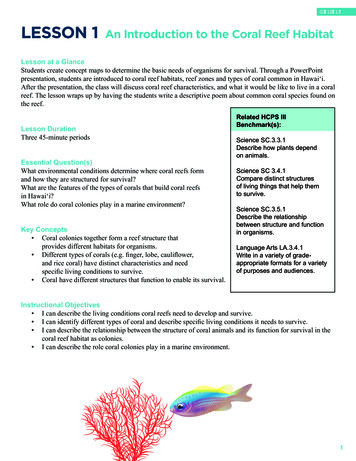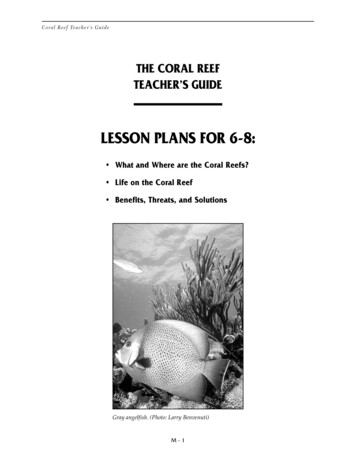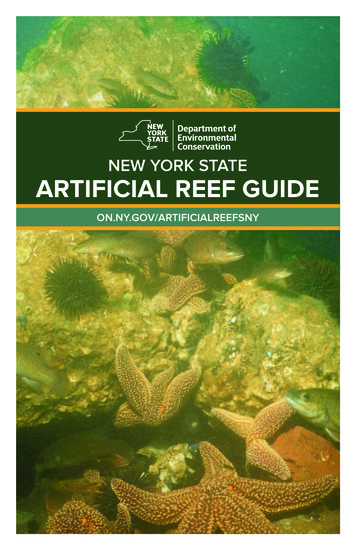
Transcription
The Project Gutenberg EBook of The Reef, by Edith WhartonThis eBook is for the use of anyone anywhere at no cost and withalmost no restrictions whatsoever. You may copy it, give it away orre-use it under the terms of the Project Gutenberg License includedwith this eBook or online at www.gutenberg.orgTitle: The ReefAuthor: Edith WhartonRelease Date: July 12, 2008 [EBook #283][Last Updated: August 19, 2017]Language: EnglishCharacter set encoding: UTF-8*** START OF THIS PROJECT GUTENBERG EBOOK THE REEF ***Produced by Gail Jahn, John Hamm, and David WidgerTHE REEFby Edith WhartonCONTENTSBOOK II
IIIIIIVVVIVIIVIIIBOOK IIIXXXIXIIXIIIXIVXVXVIBOOK IIIXVIIXVIIIXIXXXXXIXXIIBOOK IVXXIIIXXIV
XXVXXVIXXVIIXXVIIIXXIXBOOK XBOOK II“Unexpected obstacle. Please don’t come till thirtieth. Anna.”All the way from Charing Cross to Dover the train had hammered the words of thetelegram into George Darrow’s ears, ringing every change of irony on its commonplacesyllables: rattling them out like a discharge of musketry, letting them, one by one, drip slowly
and coldly into his brain, or shaking, tossing, transposing them like the dice in some game ofthe gods of malice; and now, as he emerged from his compartment at the pier, and stoodfacing the wind-swept platform and the angry sea beyond, they leapt out at him as if from thecrest of the waves, stung and blinded him with a fresh fury of derision.“Unexpected obstacle. Please don’t come till thirtieth. Anna.”She had put him off at the very last moment, and for the second time: put him off with allher sweet reasonableness, and for one of her usual “good” reasons—he was certain that thisreason, like the other, (the visit of her husband’s uncle’s widow) would be “good”! But it wasthat very certainty which chilled him. The fact of her dealing so reasonably with their caseshed an ironic light on the idea that there had been any exceptional warmth in the greeting shehad given him after their twelve years apart.They had found each other again, in London, some three months previously, at a dinner atthe American Embassy, and when she had caught sight of him her smile had been like a redrose pinned on her widow’s mourning. He still felt the throb of surprise with which, amongthe stereotyped faces of the season’s diners, he had come upon her unexpected face, with thedark hair banded above grave eyes; eyes in which he had recognized every little curve andshadow as he would have recognized, after half a life-time, the details of a room he hadplayed in as a child. And as, in the plumed starred crowd, she had stood out for him, slender,secluded and different, so he had felt, the instant their glances met, that he as sharply detachedhimself for her. All that and more her smile had said; had said not merely “I remember,” but“I remember just what you remember”; almost, indeed, as though her memory had aided his,her glance flung back on their recaptured moment its morning brightness. Certainly, whentheir distracted Ambassadress—with the cry: “Oh, you know Mrs. Leath? That’s perfect, forGeneral Farnham has failed me”—had waved them together for the march to the dining-room,Darrow had felt a slight pressure of the arm on his, a pressure faintly but unmistakablyemphasizing the exclamation: “Isn’t it wonderful?—In London—in the season—in a mob?”Little enough, on the part of most women; but it was a sign of Mrs. Leath’s quality thatevery movement, every syllable, told with her. Even in the old days, as an intent grave-eyedgirl, she had seldom misplaced her light strokes; and Darrow, on meeting her again, hadimmediately felt how much finer and surer an instrument of expression she had become.Their evening together had been a long confirmation of this feeling. She had talked to him,shyly yet frankly, of what had happened to her during the years when they had so strangelyfailed to meet. She had told him of her marriage to Fraser Leath, and of her subsequent life inFrance, where her husband’s mother, left a widow in his youth, had been re-married to theMarquis de Chantelle, and where, partly in consequence of this second union, the son hadpermanently settled himself. She had spoken also, with an intense eagerness of affection, ofher little girl Effie, who was now nine years old, and, in a strain hardly less tender, of OwenLeath, the charming clever young stepson whom her husband’s death had left to her care.A porter, stumbling against Darrow’s bags, roused him to the fact that he still obstructed theplatform, inert and encumbering as his luggage.“Crossing, sir?”Was he crossing? He really didn’t know; but for lack of any more compelling impulse hefollowed the porter to the luggage van, singled out his property, and turned to march behind itdown the gang-way. As the fierce wind shouldered him, building up a crystal wall against hisefforts, he felt anew the derision of his case.“Nasty weather to cross, sir,” the porter threw back at him as they beat their way down thenarrow walk to the pier. Nasty weather, indeed; but luckily, as it had turned out, there was no
earthly reason why Darrow should cross.While he pushed on in the wake of his luggage his thoughts slipped back into the oldgroove. He had once or twice run across the man whom Anna Summers had preferred to him,and since he had met her again he had been exercising his imagination on the picture of whather married life must have been. Her husband had struck him as a characteristic specimen ofthe kind of American as to whom one is not quite clear whether he lives in Europe in order tocultivate an art, or cultivates an art as a pretext for living in Europe. Mr. Leath’s art waswater-colour painting, but he practised it furtively, almost clandestinely, with the disdain of aman of the world for anything bordering on the professional, while he devoted himself moreopenly, and with religious seriousness, to the collection of enamelled snuff-boxes. He wasblond and well-dressed, with the physical distinction that comes from having a straight figure,a thin nose, and the habit of looking slightly disgusted—as who should not, in a world whereauthentic snuff-boxes were growing daily harder to find, and the market was flooded withflagrant forgeries?Darrow had often wondered what possibilities of communion there could have beenbetween Mr. Leath and his wife. Now he concluded that there had probably been none. Mrs.Leath’s words gave no hint of her husband’s having failed to justify her choice; but her veryreticence betrayed her. She spoke of him with a kind of impersonal seriousness, as if he hadbeen a character in a novel or a figure in history; and what she said sounded as though it hadbeen learned by heart and slightly dulled by repetition. This fact immensely increasedDarrow’s impression that his meeting with her had annihilated the intervening years. She, whowas always so elusive and inaccessible, had grown suddenly communicative and kind: hadopened the doors of her past, and tacitly left him to draw his own conclusions. As a result, hehad taken leave of her with the sense that he was a being singled out and privileged, to whomshe had entrusted something precious to keep. It was her happiness in their meeting that shehad given him, had frankly left him to do with as he willed; and the frankness of the gesturedoubled the beauty of the gift.Their next meeting had prolonged and deepened the impression. They had found each otheragain, a few days later, in an old country house full of books and pictures, in the softlandscape of southern England. The presence of a large party, with all its aimless and agitateddisplacements, had served only to isolate the pair and give them (at least to the young man’sfancy) a deeper feeling of communion, and their days there had been like some musicalprelude, where the instruments, breathing low, seem to hold back the waves of sound thatpress against them.Mrs. Leath, on this occasion, was no less kind than before; but she contrived to make himunderstand that what was so inevitably coming was not to come too soon. It was not that sheshowed any hesitation as to the issue, but rather that she seemed to wish not to miss any stagein the gradual reflowering of their intimacy.Darrow, for his part, was content to wait if she wished it. He remembered that once, inAmerica, when she was a girl, and he had gone to stay with her family in the country, she hadbeen out when he arrived, and her mother had told him to look for her in the garden. She wasnot in the garden, but beyond it he had seen her approaching down a long shady path. Withouthastening her step she had smiled and signed to him to wait; and charmed by the lights andshadows that played upon her as she moved, and by the pleasure of watching her slowadvance toward him, he had obeyed her and stood still. And so she seemed now to be walkingto him down the years, the light and shade of old memories and new hopes playing variouslyon her, and each step giving him the vision of a different grace. She did not waver or turn
aside; he knew she would come straight to where he stood; but something in her eyes said“Wait”, and again he obeyed and waited.On the fourth day an unexpected event threw out his calculations. Summoned to town bythe arrival in England of her husband’s mother, she left without giving Darrow the chance hehad counted on, and he cursed himself for a dilatory blunderer. Still, his disappointment wastempered by the certainty of being with her again before she left for France; and they did infact see each other in London. There, however, the atmosphere had changed with theconditions. He could not say that she avoided him, or even that she was a shade less glad tosee him; but she was beset by family duties and, as he thought, a little too readily resigned tothem.The Marquise de Chantelle, as Darrow soon perceived, had the same mild formidablenessas the late Mr. Leath: a sort of insistent self-effacement before which every one about hergave way. It was perhaps the shadow of this lady’s presence—pervasive even during heractual brief eclipses—that subdued and silenced Mrs. Leath. The latter was, moreover,preoccupied about her stepson, who, soon after receiving his degree at Harvard, had beenrescued from a stormy love-affair, and finally, after some months of troubled drifting, hadyielded to his step-mother’s counsel and gone up to Oxford for a year of supplementary study.Thither Mrs. Leath went once or twice to visit him, and her remaining days were packed withfamily obligations: getting, as she phrased it, “frocks and governesses” for her little girl, whohad been left in France, and having to devote the remaining hours to long shoppingexpeditions with her mother-in-law. Nevertheless, during her brief escapes from duty, Darrowhad had time to feel her safe in the custody of his devotion, set apart for some inevitable hour;and the last evening, at the theatre, between the overshadowing Marquise and theunsuspicious Owen, they had had an almost decisive exchange of words.Now, in the rattle of the wind about his ears, Darrow continued to hear the mocking echo ofher message: “Unexpected obstacle.” In such an existence as Mrs. Leath’s, at once so orderedand so exposed, he knew how small a complication might assume the magnitude of an“obstacle;” yet, even allowing as impartially as his state of mind permitted for the fact that,with her mother-in-law always, and her stepson intermittently, under her roof, her lot involveda hundred small accommodations generally foreign to the freedom of widowhood—even so,he could not but think that the very ingenuity bred of such conditions might have helped herto find a way out of them. No, her “reason”, whatever it was, could, in this case, be nothingbut a pretext; unless he leaned to the less flattering alternative that any reason seemed goodenough for postponing him! Certainly, if her welcome had meant what he imagined, she couldnot, for the second time within a few weeks, have submitted so tamely to the disarrangementof their plans; a disarrangement which—his official duties considered—might, for all sheknew, result in his not being able to go to her for months.“Please don’t come till thirtieth.” The thirtieth—and it was now the fifteenth! She flungback the fortnight on his hands as if he had been an idler indifferent to dates, instead of anactive young diplomatist who, to respond to her call, had had to hew his way through a veryjungle of engagements! “Please don’t come till thirtieth.” That was all. Not the shadow of anexcuse or a regret; not even the perfunctory “have written” with which it is usual to softensuch blows. She didn’t want him, and had taken the shortest way to tell him so. Even in hisfirst moment of exasperation it struck him as characteristic that she should not have paddedher postponement with a fib. Certainly her moral angles were not draped!“If I asked her to marry me, she’d have refused in the same language. But thank heaven Ihaven’t!” he reflected.
These considerations, which had been with him every yard of the way from London,reached a climax of irony as he was drawn into the crowd on the pier. It did not soften hisfeelings to remember that, but for her lack of forethought, he might, at this harsh end of thestormy May day, have been sitting before his club fire in London instead of shivering in thedamp human herd on the pier. Admitting the sex’s traditional right to change, she might atleast have advised him of hers by telegraphing directly to his rooms. But in spite of theirexchange of letters she had apparently failed to note his address, and a breathless emissaryhad rushed from the Embassy to pitch her telegram into his compartment as the train wasmoving from the station.Yes, he had given her chance enough to learn where he lived; and this minor proof of herindifference became, as he jammed his way through the crowd, the main point of hisgrievance against her and of his derision of himself. Half way down the pier the prod of anumbrella increased his exasperation by rousing him to the fact that it was raining. Instantly thenarrow ledge became a battle-ground of thrusting, slanting, parrying domes. The wind rosewith the rain, and the harried wretches exposed to this double assault wreaked on theirneighbours the vengeance they could not take on the elements.Darrow, whose healthy enjoyment of life made him in general a good traveller, tolerant ofagglutinated humanity, felt himself obscurely outraged by these promiscuous contacts. It wasas though all the people about him had taken his measure and known his plight; as thoughthey were contemptuously bumping and shoving him like the inconsiderable thing he hadbecome. “She doesn’t want you, doesn’t want you, doesn’t want you,” their umbrellas andtheir elbows seemed to say.He had rashly vowed, when the telegram was flung into his window: “At any rate I won’tturn back”—as though it might cause the sender a malicious joy to have him retrace his stepsrather than keep on to Paris! Now he perceived the absurdity of the vow, and thanked his starsthat he need not plunge, to no purpose, into the fury of waves outside the harbour.With this thought in his mind he turned back to look for his porter; but the contiguity ofdripping umbrellas made signalling impossible and, perceiving that he had lost sight of theman, he scrambled up again to the platform. As he reached it, a descending umbrella caughthim in the collar-bone; and the next moment, bent sideways by the wind, it turned inside outand soared up, kite-wise, at the end of a helpless female arm.Darrow caught the umbrella, lowered its inverted ribs, and looked up at the face it exposedto him.“Wait a minute,” he said; “you can’t stay here.”As he spoke, a surge of the crowd drove the owner of the umbrella abruptly down on him.Darrow steadied her with extended arms, and regaining her footing she cried out: “Oh, dear,oh, dear! It’s in ribbons!”Her lifted face, fresh and flushed in the driving rain, woke in him a memory of having seenit at a distant time and in a vaguely unsympathetic setting; but it was no moment to follow upsuch clues, and the face was obviously one to make its way on its own merits.Its possessor had dropped her bag and bundles to clutch at the tattered umbrella. “I boughtit only yesterday at the Stores; and—yes—it’s utterly done for!” she lamented.Darrow smiled at the intensity of her distress. It was food for the moralist that, side by sidewith such catastrophes as his, human nature was still agitating itself over its microscopicwoes!“Here’s mine if you want it!” he shouted back at her through the shouting of the gale.
The offer caused the young lady to look at him more intently. “Why, it’s Mr. Darrow!” sheexclaimed; and then, all radiant recognition: “Oh, thank you! We’ll share it, if you will.”She knew him, then; and he knew her; but how and where had they met? He put aside theproblem for subsequent solution, and drawing her into a more sheltered corner, bade her waittill he could find his porter.When, a few minutes later, he came back with his recovered property, and the news that theboat would not leave till the tide had turned, she showed no concern.“Not for two hours? How lucky—then I can find my trunk!”Ordinarily Darrow would have felt little disposed to involve himself in the adventure of ayoung female who had lost her trunk; but at the moment he was glad of any pretext foractivity. Even should he decide to take the next up train from Dover he still had a yawninghour to fill; and the obvious remedy was to devote it to the loveliness in distress under hisumbrella.“You’ve lost a trunk? Let me see if I can find it.”It pleased him that she did not return the conventional “Oh, would you?” Instead, shecorrected him with a laugh—“Not a trunk, but my trunk; I’ve no other—” and then addedbriskly: “You’d better first see to getting your own things on the boat.”This made him answer, as if to give substance to his plans by discussing them: “I don’tactually know that I’m going over.”“Not going over?”“Well . perhaps not by this boat.” Again he felt a stealing indecision. “I may probablyhave to go back to London. I’m—I’m waiting . expecting a letter.(She’ll think me adefaulter,” he reflected.) “But meanwhile there’s plenty of time to find your trunk.”He picked up his companion’s bundles, and offered her an arm which enabled her to pressher slight person more closely under his umbrella; and as, thus linked, they beat their wayback to the platform, pulled together and apart like marionettes on the wires of the wind, hecontinued to wonder where he could have seen her. He had immediately classed her as acompatriot; her small nose, her clear tints, a kind of sketchy delicacy in her face, as thoughshe had been brightly but lightly washed in with water-colour, all confirmed the evidence ofher high sweet voice and of her quick incessant gestures. She was clearly an American, butwith the loose native quality strained through a closer woof of manners: the compositeproduct of an enquiring and adaptable race. All this, however, did not help him to fit a nameto her, for just such instances were perpetually pouring through the London Embassy, and theetched and angular American was becoming rarer than the fluid type.More puzzling than the fact of his being unable to identify her was the persistent senseconnecting her with something uncomfortable and distasteful. So pleasant a vision as thatgleaming up at him between wet brown hair and wet brown boa should have evoked onlyassociations as pleasing; but each effort to fit her image into his past resulted in the samememories of boredom and a vague discomfort.II
“Don’t you remember me now—at Mrs. Murrett’s?” She threw the question at Darrowacross a table of the quiet coffee-room to which, after a vainly prolonged quest for her trunk,he had suggested taking her for a cup of tea.In this musty retreat she had removed her dripping hat, hung it on the fender to dry, andstretched herself on tiptoe in front of the round eagle-crowned mirror, above the mantel vasesof dyed immortelles, while she ran her fingers comb-wise through her hair. The gesture hadacted on Darrow’s numb feelings as the glow of the fire acted on his circulation; and when hehad asked: “Aren’t your feet wet, too?” and, after frank inspection of a stout-shod sole, shehad answered cheerfully: “No—luckily I had on my new boots,” he began to feel that humanintercourse would still be tolerable if it were always as free from formality.The removal of his companion’s hat, besides provoking this reflection, gave him his firstfull sight of her face; and this was so favourable that the name she now pronounced fell onhim with a quite disproportionate shock of dismay.“Oh, Mrs. Murrett’s—was it there?”He remembered her now, of course: remembered her as one of the shadowy sidlingpresences in the background of that awful house in Chelsea, one of the dumb appendages ofthe shrieking unescapable Mrs. Murrett, into whose talons he had fallen in the course of hishead-long pursuit of Lady Ulrica Crispin. Oh, the taste of stale follies! How insipid it was, yethow it clung!“I used to pass you on the stairs,” she reminded him.Yes: he had seen her slip by—he recalled it now—as he dashed up to the drawing-room inquest of Lady Ulrica. The thought made him steal a longer look. How could such a face havebeen merged in the Murrett mob? Its fugitive slanting lines, that lent themselves to all mannerof tender tilts and foreshortenings, had the freakish grace of some young head of the Italiancomedy. The hair stood up from her forehead in a boyish elf-lock, and its colour matched herauburn eyes flecked with black, and the little brown spot on her cheek, between the ear thatwas meant to have a rose behind it and the chin that should have rested on a ruff. When shesmiled, the left corner of her mouth went up a little higher than the right; and her smile beganin her eyes and ran down to her lips in two lines of light. He had dashed past that to reachLady Ulrica Crispin!“But of course you wouldn’t remember me,” she was saying. “My name is Viner—SophyViner.”Not remember her? But of course he did! He was genuinely sure of it now. “You’re Mrs.Murrett’s niece,” he declared.She shook her head. “No; not even that. Only her reader.”“Her reader? Do you mean to say she ever reads?”Miss Viner enjoyed his wonder. “Dear, no! But I wrote notes, and made up the visitingbook, and walked the dogs, and saw bores for her.”Darrow groaned. “That must have been rather bad!”“Yes; but nothing like as bad as being her niece.”“That I can well believe. I’m glad to hear,” he added, “that you put it all in the past tense.”She seemed to droop a little at the allusion; then she lifted her chin with a jerk of defiance.“Yes. All is at an end between us. We’ve just parted in tears—but not in silence!”“Just parted? Do you mean to say you’ve been there all this time?”
“Ever since you used to come there to see Lady Ulrica? Does it seem to you so awfullylong ago?”The unexpectedness of the thrust—as well as its doubtful taste—chilled his growingenjoyment of her chatter. He had really been getting to like her—had recovered, under thecandid approval of her eye, his usual sense of being a personable young man, with all theprivileges pertaining to the state, instead of the anonymous rag of humanity he had felthimself in the crowd on the pier. It annoyed him, at that particular moment, to be remindedthat naturalness is not always consonant with taste.She seemed to guess his thought. “You don’t like my saying that you came for LadyUlrica?” she asked, leaning over the table to pour herself a second cup of tea.He liked her quickness, at any rate. “It’s better,” he laughed, “than your thinking I came forMrs. Murrett!”“Oh, we never thought anybody came for Mrs. Murrett! It was always for something else:the music, or the cook—when there was a good one—or the other people; generally one of theother people.”“I see.”She was amusing, and that, in his present mood, was more to his purpose than the exactshade of her taste. It was odd, too, to discover suddenly that the blurred tapestry of Mrs.Murrett’s background had all the while been alive and full of eyes. Now, with a pair of themlooking into his, he was conscious of a queer reversal of perspective.“Who were the ‘we’? Were you a cloud of witnesses?”“There were a good many of us.” She smiled. “Let me see—who was there in your time?Mrs. Bolt—and Mademoiselle—and Professor Didymus and the Polish Countess. Don’t youremember the Polish Countess? She crystal-gazed, and played accompaniments, and Mrs.Murrett chucked her because Mrs. Didymus accused her of hypnotizing the Professor. But ofcourse you don’t remember. We were all invisible to you; but we could see. And we all usedto wonder about you——”Again Darrow felt a redness in the temples. “What about me?”“Well—whether it was you or she who.”He winced, but hid his disapproval. It made the time pass to listen to her.“And what, if one may ask, was your conclusion?”“Well, Mrs. Bolt and Mademoiselle and the Countess naturally thought it was she; butProfessor Didymus and Jimmy Brance—especially Jimmy——”“Just a moment: who on earth is Jimmy Brance?”She exclaimed in wonder: “You were absorbed—not to remember Jimmy Brance! He musthave been right about you, after all.” She let her amused scrutiny dwell on him. “But howcould you? She was false from head to foot!”“False——?” In spite of time and satiety, the male instinct of ownership rose up andrepudiated the charge.Miss Viner caught his look and laughed. “Oh, I only meant externally! You see, she oftenused to come to my room after tennis, or to touch up in the evenings, when they were goingon; and I assure you she took apart like a puzzle. In fact I used to say to Jimmy—just to makehim wild—: ‘I’ll bet you anything you like there’s nothing wrong, because I know she’d neverdare un—‘” She broke the word in two, and her quick blush made her face like a shallowpetalled rose shading to the deeper pink of the centre.
The situation was saved, for Darrow, by an abrupt rush of memories, and he gave way to amirth which she as frankly echoed. “Of course,” she gasped through her laughter, “I only saidit to tease Jimmy——”Her amusement obscurely annoyed him. “Oh, you’re all alike!” he exclaimed, moved by anunaccountable sense of disappointment.She caught him up in a flash—she didn’t miss things! “You say that because you think I’mspiteful and envious? Yes—I was envious of Lady Ulrica. Oh, not on account of you orJimmy Brance! Simply because she had almost all the things I’ve always wanted: clothes andfun and motors, and admiration and yachting and Paris—why, Paris alone would be enough!—And how do you suppose a girl can see that sort of thing about her day after day, and neverwonder why some women, who don’t seem to have any more right to it, have it all tumbledinto their laps, while others are writing dinner invitations, and straightening out accounts, andcopying visiting lists, and finishing golf-stockings, and matching ribbons, and seeing that thedogs get their sulphur? One looks in one’s glass, after all!”She launched the closing words at him on a cry that lifted them above the petulance ofvanity; but his sense of her words was lost in the surprise of her face. Under the flying cloudsof her excitement it was no longer a shallow flower-cup but a darkening gleaming mirror thatmight give back strange depths of feeling. The girl had stuff in her—he saw it; and sheseemed to catch the perception in his eyes.“That’s the kind of education I got at Mrs. Murrett’s—and I never had any other,” she saidwith a shrug.“Good Lord—were you there so long?”“Five years. I stuck it out longer than any of the others.” She spoke as though it weresomething to be proud of.“Well, thank God you’re out of it now!”Again a just perceptible shadow crossed her face. “Yes—I’m out of it now fast enough.”“And what—if I may ask—are you doing next?”She brooded a moment behind drooped lids; then, with a touch of hauteur: “I’m going toParis: to study for the stage.”“The stage?” Darrow stared at her, dismayed. All his confused contradictory impressionsassumed a new aspect at this announcement; and to hide his surprise he added lightly: “Ah—then you will have Paris, after all!”“Hardly Lady Ulrica’s Paris. It’s not likely to be roses, roses all the way.”“It’s not, indeed.” Real compassion prompted him to continue: “Have you any—anyinfluence you can count on?”She gave a somewhat flippant little laugh. “None but my own. I’ve never had any other tocount on.”He passed over the obvious reply. “But have you any idea how the profession is overcrowded? I know I’m trite——”“I’ve a very clear idea. But I couldn’t go on as I was.”“Of course not. But since, as you say, you’d stuck it out longer than any of the others,couldn’t you at least have held on till you were sure of some kind of an opening?”She made no reply for a moment; then she turned a listless glance to the rain-beatenwindow. “Oughtn’t we be starting?” she asked, with a lofty assumption of indifference thatmight have been Lady Ulrica’s.
Darrow, surprised by the change, but accepting her rebuff as a phase of what he guessed tobe a confused and tormented mood, rose from his seat and lifted her jacket from the chairback on which she had hung it to dry. As he held it toward her she looked up at him quickly.“The truth is, we quarrelled,” she broke out, “and I left last night without my dinner—andwithout my salary.”“Ah—” he groaned, with a sharp perception of all the sordid dangers that might attend sucha break with Mrs. Murrett.“And without a character!” she added, as she slipped her arms into the jacket. “And withouta trunk, as it appears—but didn’t you say that, before going, there’d be time for another lookat the station?”There was time for another look at the station; but the look again resulted indisappointment,
The Project Gutenberg EBook of The Reef, by Edith Wharton This eBook is for the use of anyone anywhere at no cost and with almost no restrictions whatsoever. You may copy it, give it away or re-use it under the terms of the Project Gutenberg License included with this eBook or online at www.gutenberg.org Title: The Reef Author: Edith Wharton










